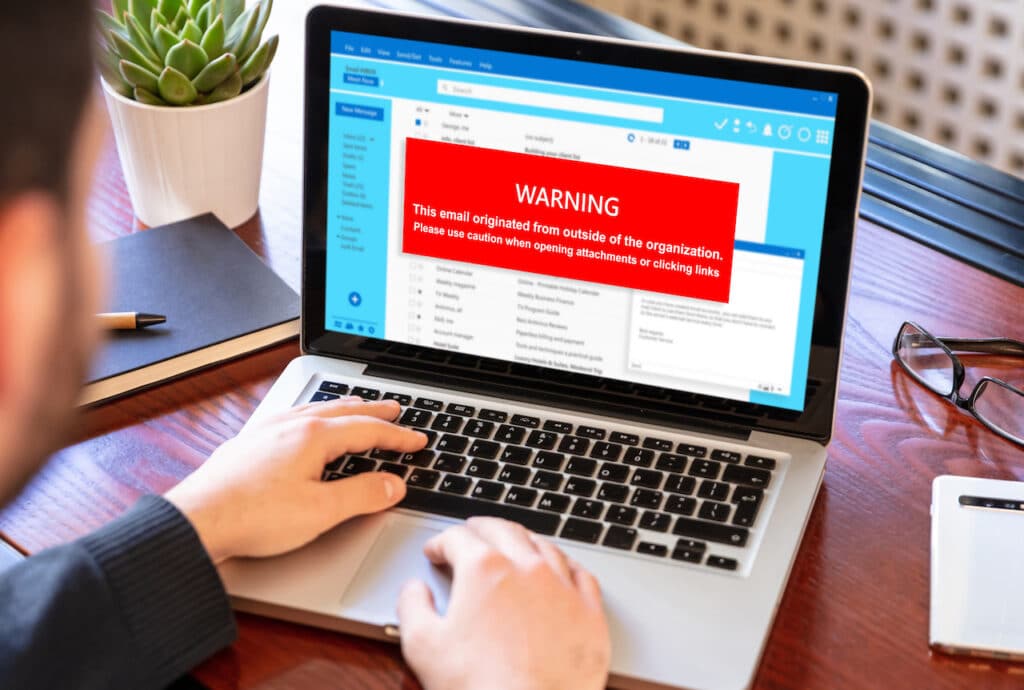
Phishing attacks are becoming more common and sophisticated. Over 81% of companies around the world have experienced an increase in phishing email attacks since March 2020.
Phishing can often be difficult to identify, so TrinWare offers a fake phishing campaign with every MSP agreement, which will help you learn to identify these phishing attacks. But let’s be clear, when we talk about a fake phishing campaign, we’re not referring to a malicious campaign. This is used as a training tool to help raise awareness about real phishing campaigns and allows you to better defend your business.
But first, you might be asking yourself what is phishing and what is a common indicator of a phishing attempt. Here is what you need to know about phishing and how it affects businesses.
What Is Phishing?
Phishing is a malicious attempt to acquire sensitive information such as login credentials or financial information by disguising oneself as a trustworthy entity in electronic communication.
How Does Phishing Work?
Phishing attacks usually begin with an email or other electronic communication that appears to come from a legitimate source, such as a bank, credit card company, or online retailer. The message may contain a sense of urgency or threaten some type of negative action if the recipient does not take immediate action. For example, an attacker may claim that the recipient’s bank account will be frozen unless they provide their login credentials.
In some cases, the message may contain a link that leads to a malicious website. This website may look identical to the legitimate website, but it is designed to steal the victim’s login credentials or infect their computer with malware. In other cases, the message may contain an attachment that contains malware.
Types of Phishing
There are many types of phishing attacks, but they all share a common goal: stealing sensitive information or infecting computers with malware. Some of the most common types of phishing attacks include:
- Spear Phishing Attacks: Targets specific individuals or organizations
- Whaling Attacks: Targets high-profile individuals such as CEOs or celebrities
- Email Spoofing: Involves creating fraudulent emails that appear to come from a legitimate source
- Smishing Attacks: Uses text messages instead of email to trick victims
- Vishing Attacks: Uses voice messages or phone calls to trick victims
But what is a common indicator of a phishing attempt? Luckily, there are signs to look out for that will help you avoid these types of attacks.
What is a Common Indicator of a Phishing Attempt?
Here are several common indicators that can help you identify a phishing attempt:
- The message creates a sense of urgency or fear
- The message contains grammatical errors or unusual wording
- The sender’s email address does not match the name of the company they’re claiming to represent
- You’re being asked to click on a link or open an attachment to verify your account or update your information
- You’re being asked to provide sensitive information such as login credentials, Social Security number, or bank account information
How Does Phishing Affect My Business?
Phishing can have a serious impact on your business. If sensitive information such as login credentials or financial information is acquired, it can lead to identity theft, fraud, and financial losses. A successful phishing attack can also damage your company’s reputation and result in a loss of customer trust.
Preventing Phishing Attacks with TrinWare’s Phishing Campaign
There are several steps you can take to prevent phishing attacks. One way to help protect your business is through TrinWare’s fake phishing campaign. But what is our fake phishing campaign? It’s a test! Phishing emails are becoming harder and harder to identify so our system will send a fake test email to you and your staff. If someone clicks on it, instead of stealing information or loading viruses, the link will explain why this was a fake email and how to identify them in the future.
Through this fake phishing campaign, you will be able to help educate your staff so that they can identify real phishing emails and avoid them in the future.
Other steps that you can take to avoid real phishing emails include:
- Install anti-phishing software on your company’s computers and devices
- Monitor your company’s email accounts for suspicious activity
- Filter incoming email messages to block known phishing attempts
- Do not click on links or open attachments from unknown senders
- Do not respond to email messages that create a sense of urgency or fear
If you receive an email that contains any of these common indicators of a phishing attempt, report it to your IT department or security team.
Prevent Phishing Attacks with TrinWare
If you’re looking for a way to prevent phishing attacks, TrinWare can help. Our fake phishing campaign, which is free with our MSP packages, will help educate your employees on how to identify phishing attempts and block malicious email messages.
For more information on how you can start better protecting your team from phishing attacks schedule a consultation with our cyber experts today.




